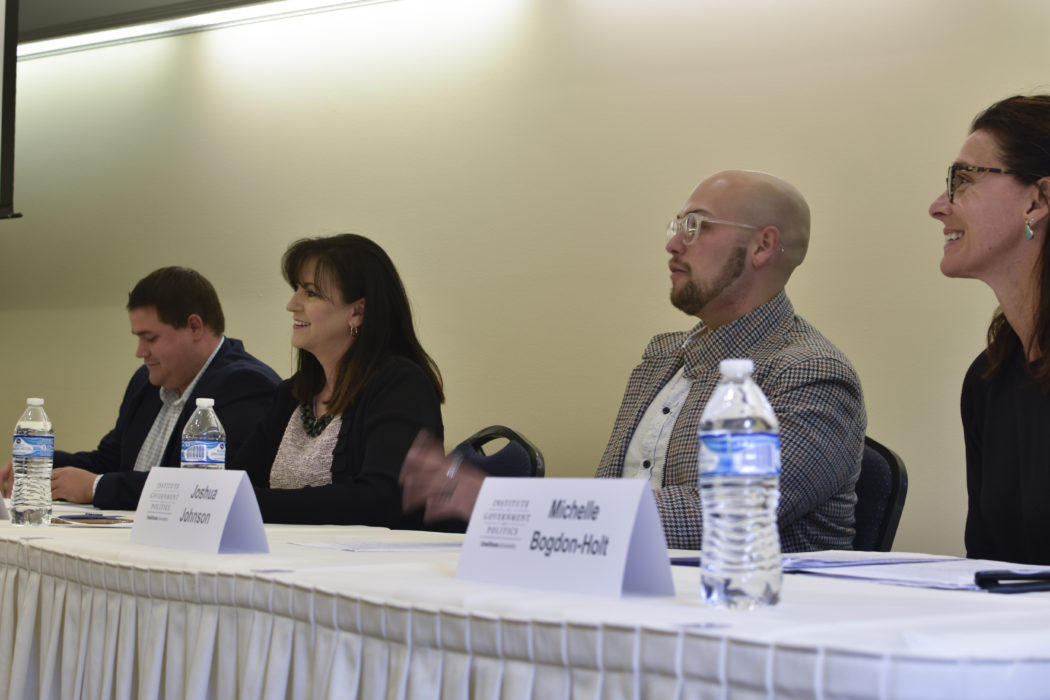USU holds free speech discussion on campus
Utah State University held a panel discussion Thursday night to discuss free speech and public universities – more specifically what a public university’s role is in protecting freedom of speech.
“We’re here this evening for a candid discussion on an important topic,” said Joe Ward, the dean of the College of Humanities and Social Sciences.
The event, which was hosted by USU’s Institute of Government and Politics and the Aggie’s Think Care Act, was open to the public and encouraged students from all over campus to attend.
“The main thing is just engaging students in this conversation because it’s a big topic of conversation on the Capitol Hill – both in Salt Lake and D.C.– so we want students to be a part of that first hand,” said Neil Abercrombie, the director of government relations for the IGOP. “I think it was a good panel – they really got to the depth of these really tricky legal issues.”
One of the panelists, Rep. Kim Coleman, R-West Jordan, sponsored a bill in 2016 addressing free speech at Utah universities. HB54 was passed into law in 2017, and designated all outdoor areas of Utah university campuses as “public forums.”
“I think students need to understand the value of free speech and understand the law behind free speech,” Coleman said. “We value respect and respectful tones in our discourse but the law does not allow the university to shut down speech that is protected. Even if it’s offensive to some – even if it’s crude, rude.”
Coleman said it’s important students understand what their rights are.
“If you choose to be rude, crude, offensive, you might not get invited to that many parties but it’s your right to be that way,” she said.
Coleman also said speech rights are powerful in impacting change in government.
“The minority voices have been powerful in their speech rights to really affect great advances in civil rights over time and great advances in public policy. We want to protect those rights to speak – whether we agree with them or no,” Coleman said.
The rest of the panel was composed of Michelle Bogdan-Holt, USU’s Access and Diversity Center’s director, Josh Johnson, USU’s Student Association VP for diversity and clubs, and Michael Melendez, the Libertas director of policy.
The discussion was moderated by Geoffrey Landward, an assistant commissioner of higher education for policy and law.
Landward began the discussion by first defining free speech and what kind of speech is protected and what is not.
If nooses were hung on trees all around campus, it wouldn’t necessarily be an example of unprotected speech, Landward said.
Now if a noose was hung on the door of an African American student, he continued, then this could be entering the territory of unprotected speech – because it implies a direct threat of violence.
Landward then opened the discussion up to the panel and asked about a variety of topics including how do university students view free speech, whether universities should cancel speakers after student protests, and what falls under the university’s job description when it comes to providing a safe learning environment.
The panel discussion ended with what Landward deemed the “most important” question of the evening: Why is hate speech protected?
Melendez answered the question with another question: How can you define hate speech? He said defining hate speech quickly becomes a “slippery slope.”
Coleman continued off of Melendez’s point and answered with a question as well: Who do you want deciding what hate speech is?
“You might not like the guy sitting in the White House,” Coleman told the audience. “You might love the guy – do you want him deciding what hate speech is? Do you want the person before him deciding?”
The government is not the entity you want in charge of defining hate speech, Coleman said.
“Where do you draw the line?” she asked the audience.
Johnson then gave his opinion on hate speech.
“No, I don’t think hate speech should be protected,” he said.
Hate speech has the potential to impact an individual psychologically and even physically, he said. Johnson said the government should put laws in place that protect people from hate speech.
Bogdan-Holt disagreed with Johnson and said there should be no hate speech laws put in place because “people have sacrificed so much to preserve the right to free speech in this country.”
“People have died throughout the history of this country practicing their free speech,” Bogdan-Holt said.
While Bogdan-Holt said no laws should be made against hate speech, she also said it is important to stand up to hate speech with one’s free speech. She said she agreed with Johnson’s point about how harmful hate speech can be on an individual.
A database of U.S. university speech policies is available here.
laurenmarie.bennett@aggiemail.usu.edu
@laurmarben

